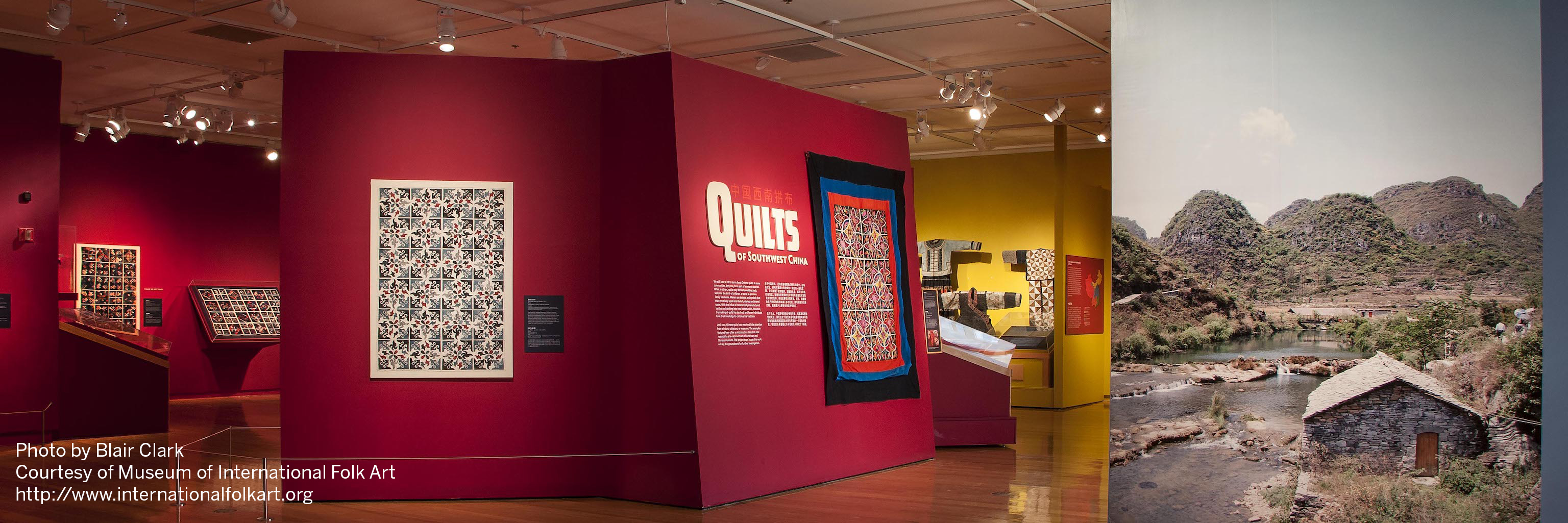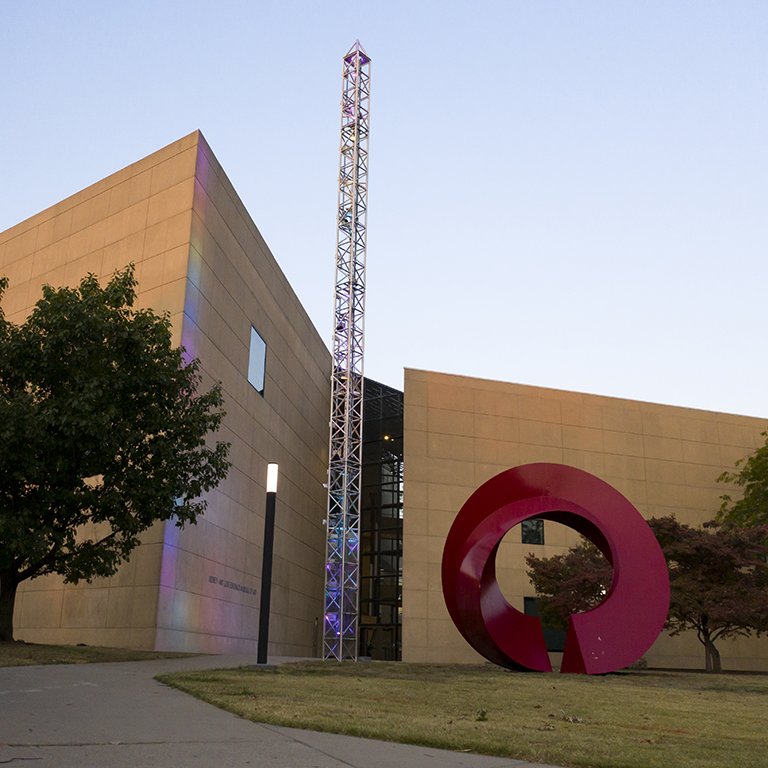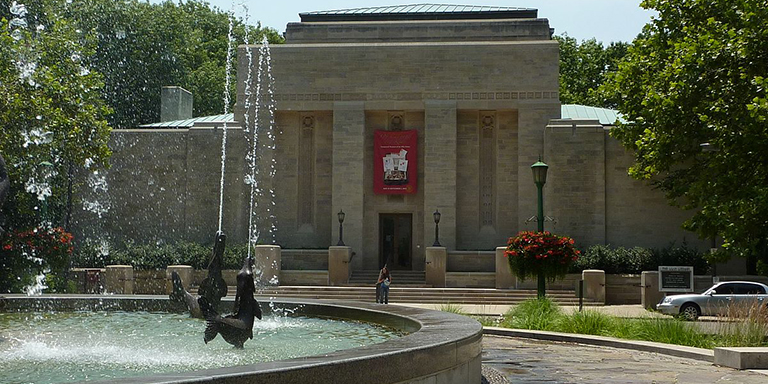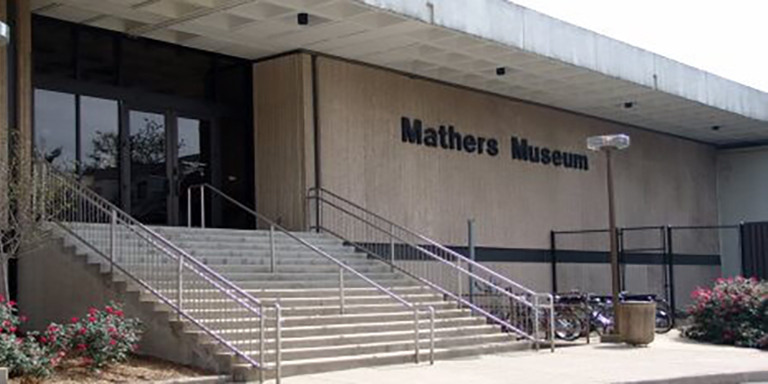Museums and collections are one key area in which folklorists and ethnomusicologists work and the Department of Folklore and Ethnomusicology at Indiana University offers students a rich environment in which to investigate and pursue these aspects of our two fields. To help you learn more, information on the department’s museums and collections activities are gathered below in five sections
Museums + Collections
- Museums + Department of Folklore and Ethnomusicology: A snapshot
This note on the place of museums in the work of the Department of Folklore and Ethnomusicology was written on the day that the department published volume 26 (Summer 2020) of its alumni newsletter Traditions. Study of that issue helps evoke some of the ways that the department’s alumni, current students, and faculty are involved working at the intersection of museum practice and the fields of folklore and ethnomusicology.
In that issue of Traditions we learned that Megan Ellingwood (B.A., 2010) had then just been promoted to a new role on the staff of the Seattle’s Museum of Flight, where she works in the museum’s education department. Readers also learned that Ian Hallagan (B.A., 2014) was then beginning work as the Folklife Program Coordinator at the University of South Carolina’s McKissick Museum. Also, in the issue was a report on Andrea Hadsell (B.A., 2015) who works as Education Manager for the Monroe County History Center.
In a detailed profile of public folklorist Selina Morales (M.A., 2009), she shared how her Master’s exhibition and collection project at the Mathers Museum of World Cultures gave her “critical project management skills” that she uses today in her work as a Lead Folklorist for the Southwest Folklife Alliance, where she is working on the collaborative Radical Imagination for Racial Justice initiative.
The issue also reports on a recent lecture by Gabrielle Berlinger (Ph.D., 2013) staged in conjunction with the exhibition Remembering the Ephemeral: The Ritual Architecture of Sukkot in Contemporary Life. That exhibition, which Berlinger curated, was based on research reported in her book Framing Sukkot (Indiana University Press, 2017). Berlinger is an Assistant Professor of Folklore and American Studies at the University of North Carolina.
In addition, the issue evoked the work of Richard Walter (Ph.D., 2014), a Curator at the Musical Instrument Museum in Phoenix. Walter was recently involved in a podcast project on the history of the electric guitar. Traditions readers also learned that Dom Tartaglia (Ph.D., 2019) was then just appointed as Curator and Folklorist at the Ward Museum of Wildfowl Art on Maryland’s Eastern Shore.
A major museum story in the issue reported on the combined Richard M. Dorson and Herman B Wells Lectures delivered on the Indiana University campus in February 2020 by Barbara Kirshenblatt-Gimblett (Ph.D., 1972), Chief Curator of the Core Exhibition at POLIN Museum of the History of Polish Jews and University Professor emerita at New York University. Her lecture, titled, “Choreography of a Career: A Folklorist’s Evolving Perspective on Folklore, Heritage, and Museums” reflected on a career in which museums have figured prominently and in which she has made keystone theoretical contributions to the understanding of museums and important curatorial contributions working within them.
Traditions readers were also given a glimpse of the museum engagements of some then current students. Aliah Ajamoughli (Ph.D., 2022) received a travel grant to do research at the Arab American National Museum. The issue also profiled the dissertation research of Emily Bryant (Ph.D., 2022), who studied a vast and important collection of dress and jewelry assembled among the peoples of Central Asia, the Middle East and North Africa. A third Ph.D. student’s museum research—that of folklorist Emmie Pappa—was also profiled. Their ethnographic work focuses on the community that centers on The Burlesque Hall of Fame, a museum in Las Vegas, Nevada.
Finally, evidence of faculty museum engagements was also to be found in the issue. Associate Professor of Ethnomusicology Rebecca Dirksen curated the exhibition Sacred Drums, Sacred Trees: Haiti’s Changing Climate and the issue discussed the fall 2019 programming that she organized in connection with the exhibition, which was on display at the Mathers Museum of World Cultures.
While the degree to which this single issue of Traditions touches on the museum work of the Department’s wider community, may seem surprising, close study of the issue actually points to a great many more museum stories hiding beneath the surface. A reader scouring the issue will find notes about or images of current students Suyash Kumar Neupane, Micah Ling, Jennie Williams, Doug Peach, Wuerxiya, and Emilly Bianchi as well as alumni Jim Seaver (Ph.D., 2018), Kristin Otto (Ph.D., 2020), Evangeline Mee (M.A., 2019), Emily Rogers (Ph.D., 2020), Janice Frisch (Ph.D., 2013), Lijun Zhang (Ph.D. 2014), Thomas Richardson (Ph.D., 2019), Meredith McGriff (Ph.D., 2016), Kelley Totten (Ph.D., 2017), Tom Mould (Ph.D., 2001), Suzanne Ingalsbe (Ph.D., 2017), Carrie Hertz (Ph.D., 2013), Kate Schramm (Ph.D., 2016), Maria Zeringue (M.A., 2017), and Jessica Anderson Turner (Ph.D., 2010). Also found therein are faculty members Pravina Shukla, Jason Baird Jackson (Ph.D., 1998), Henry Glassie, and Jon Kay (Ph.D., 2014). All of these ethnomusicologists and folklorists have deep involvement in the work of museums. The list would be still longer if the various folkloristic and ethnomusicological archivists and librarians, whose work is curatorial in nature, that were featured in the issue were added to this list.
This tour of a single issue of the Department of Folklore and Ethnomusicology’s newsletter is intended to underline a key point about the department. Museums are definitely not the only venues in which ethnomusicologists and folklorists pursue their studies and take up professional work, but they are a key venue. Of course, study of a different issue of Traditions would have produced a different list of museum-minded folklorists and ethnomusicologist. This is just a sample of our larger community.
If you have an interest in both museums and expressive culture, the Department of Folklore and Ethnomusicology has a lot to offer. We hope that you will be in touch and that you will consider joining us as a student, whether as a B.A. major or minor, and M.A. student in folklore, ethnomusicology, or curatorship, or as a Ph.D major or minor in folklore or ethnomusicology.
- Museums-related courses + practicum in our department
At the undergraduate level, the department regularly offers a range of courses related to material culture studies, including FOLK-F 440 Museums and Material Culture. This course regularly takes a museum focus and introduces students to museums as sites for both research and for educational outreach. The department also offers FOLK-X 476 Museum Practicum in Folklore. Museum practicum have long been the springboard that folklore and ethnomusicology undergraduates have used to launch their museum careers. Undergraduate students interested in arranging a museum practicum can find more information here. For graduate students, practicum information is available here. Undergraduate students interested in exploring museum work can also take a general introduction offered in the Department of Anthropology— ANTH-A 403 Introduction to Museum Studies.
At the graduate level, the department offers an unusually wide range of courses relevant for students seeking museum careers, to pursue work in partnership with museums, or to undertake research on museums. These include FOLK-F 730 Museums and Material Culture, FOLK-F 731 Curatorship, and FOLK-F 540 Material Culture and Folklife. Material Culture and Folklife is a variable topics course in which a range of themes in material culture studies are explored in different versions of the course. Recent topics include body art, craft, foodways, and material culture theory. In addition to these courses, graduate students in folklore and ethnomusicology preparing for careers in museums also regularly take FOLK-F 532 Public Practice in Folklore and Ethnomusicology, FOLK-F533 Applied Folklore, FOLK-E533 Applied Ethnomusicology, and FOLK-F 805 Laboratory in Public Folklore. Together with other required and elective courses offered by the department, this large range of courses comprehensively prepares students for success as museum folklorists and ethnomusicologists. Many of these courses have hands-on components and students are encouraged to undertake a museum practicum to put this training to work in a relevant campus, community, or national museum. This is done through the dedicated course FOLK-F 806 Museum Practicum in Folklore.
In addition to museums related courses in the department and on the Indiana University campus in Bloomington, you can also can make arrangements to take additional museums-related courses at Indiana University Indianapolis, home to a robust Museum Studies Program.
- Museum + collection resources
Some of the special resources available to our students with museum and collections are discussed below. This is just a sample of resources.
The Department of Folklore and Ethnomusicology is a key partner with Traditional Arts Indiana (TAI), Indiana’s state-wide program supporting folk and traditional arts and the communities that nurture and draw upon them. TAI is directed by faculty member Jon Kay. TAI has an active exhibitions program and Department students have long played key roles in it, and in the work of TAI as a whole.
Another key partner for our department is the Archives of Traditional Music (ATM), one of the largest university-based ethnographic sound archives in the United States. Generations of Department students have gained archival and curatorial experience through work at the ATM.
The Indiana University is home to a vast range of collections and several museums, including many of special relevance to folklorists and ethnomusicologists for the study of vernacular culture and everyday life around the world. As a student at IU, these collections are resource for your studies and, by working alongside the staff that curates and interprets them, students have opportunities to put their growing disciplinary knowledge to work while gaining significant career experiences. Campus collections are used not only for individual research projects, they are also often incorporated in departmental courses. More information on Indiana University collections, including IU museums and galleries, is available from the Collections @ IU website.
Our students have also long engaged with, and contributed to the work of local museums in the Bloomington area. Some of these can be discovered on the website for the Alliance of Bloomington Museums.
The Material Culture and Heritage Studies Laboratory led by Jason Baird Jackson is based in the Department of Folklore and Ethnomusicology. MCHSL research focuses on museums and museum collections and the lab provides opportunities for undergraduate and graduate students to participate in this research.
The Department of Folklore and Ethnomusicology is home to the editorial office for the journal Museum Anthropology Review (MAR), edited by faculty member Jason Baird Jackson and published by Indiana University Press. Students have regularly been involved in the work of editing MAR and have also contributed reviews and peer-reviewed articles to it.
- Curatorship program (M.A. and Ph.D. minor)
The Department of Folklore and Ethnomusicology is a key partner in the campus’ interdisciplinary graduate program in Curatorship. That program includes both an M.A. in Curatorship and a Ph.D. minor in Curatorship. Doctoral students studying either ethnomusicology or folklore studies in the department can elect to pursue the Curatorship Ph.D. minor. Current students interested in this option should consult their advisor and the Director of the Curatorship program.
Admission to the Curatorship M.A. is separate from admission to an M.A. program in the department, but students pursuing the M.A. in Curatorship select a disciplinary focus area and such students are encouraged to pursue folklore studies or ethnomusicology as such an area of interest. Applicants to the Curatorship M.A. program with such interests are encouraged to note them in their application materials.
Two courses taught regularly in the Department of Folklore and Ethnomusicology—FOLK-F 730 Museums and Material Culture and FOLK-F 731 Curatorship fulfill two core requirements for the Curatorship M.A. and Ph.D. minor. Numerous other courses taught in the department count as Curatorship electives.
Eric Sandweiss, Thomas and Kathryn Miller Professor of History in the Department of History and an adjunct professor in the Department of Folklore and Ethnomusicology directs the Curatorship M.A. and Ph.D. minor and is available to consult with interested students. More information on the Curatorship program, including contact information for additional information, is available here.
- Faculty with museums + collections interests
K. Brandon Barker, assistant professor of folklore, has research interests in material culture, including the study of musical instruments, and he has lectured to museum audiences
Ray Cashman, professor of folklore, has research interests in material culture and has published on the vernacular collecting practices found in Irish communities.
Rebecca Dirksen, associate professor of ethnomusicology, is focused on strengthening applied and public-facing work in ethnomusicology. She curated the exhibition Sacred Drums, Sacred Trees: Haiti’s Changing Climate, led work to develop the Ethnomusicology Advocacy Toolkit, and regularly teaches the course Applied Ethnomusicology.
Barbara Hillers, associate professor of folklore, does work that draws on and strengthens folklore archives and she teaches courses related to such archives, including on their use and status in the digital age.
Jason Baird Jackson, Ruth N. Halls Professor of Folklore and Anthropology, served as Curator of Anthropology at Tulsa’s Gilcrease Museum and as Assistant Curator of Ethnology at the Sam Noble Oklahoma Museum of Natural History before joining the department. Between 2013 and 2019, he served as director of the Mathers Museum of World Cultures. He is the curator of many exhibitions and his research includes a focus on the study of museum collections and on the work of museums. He regularly teaches Curatorship, Museums and Material Culture and other courses related to these interests.
Jon Kay, associate professor of folklore, is Director of Traditional Arts Indiana. He has long collaborated with museums on public programs and exhibitions and, between 2015 and 2019, he was Curator of Folklife and Cultural Heritage at the Mathers Museum of World Cultures. He has curated numerous special exhibitions and he oversees TAI’s rotating exhibition network, an ongoing traveling exhibitions program related to folk arts and traditional culture in Indiana.
Fernando Orejuela, senior lecturer, has served as a consultant to the Muncie Children’s Museum and lectured to audiences at various museums on his research topics of children’s folklore, hip-hop culture, and youth sub-cultures. He has also developed museum programs related to children’s folklore and has done museum work at the Children’s Museum of Indianapolis and the Mathers Museum of World Cultures. He is on the Advisory Committees for the National Museum of African American Music and for the Coalition for the National Museum of the American People.
Pravina Shukla, professor of folklore, worked at the Craft and Folk Art Museum, UCLA’s Fowler Museum of Cultural History and the American Museum of Natural History before joining the department as a faculty member. She regularly teaches Museums and Material Culture, Body Art: Dress and Adornment, and Folk Art and other courses related to the study of museums and material culture. She has curated numerous exhibitions and her writings and her exhibition work both focus on folk arts as practiced in diverse societies around the world.




 The College of Arts
The College of Arts